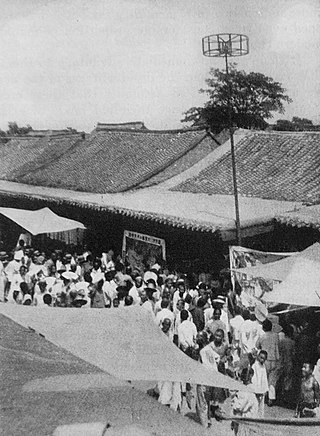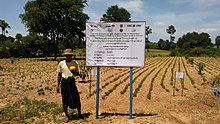The United Nations defines community development as "a process where community members come together to take collective action and generate solutions to common problems." It is a broad concept, applied to the practices of civic leaders, activists, involved citizens, and professionals to improve various aspects of communities, typically aiming to build stronger and more resilient local communities.
Danish Committee for Aid to Afghan Refugees (DACAAR)(Danish: Den danske komité for hjælp til afghanske flygtninge) is a non-political, non-governmental, non-profit humanitarian and development organization working to improve the lives of the Afghan people since 1984.
Agricultural extension is the application of scientific research and new knowledge to agricultural practices through farmer education. The field of 'extension' now encompasses a wider range of communication and learning activities organized for rural people by educators from different disciplines, including agriculture, agricultural marketing, health, and business studies.
The International Centre of Insect Physiology and Ecology is an international scientific research institute, headquartered in Nairobi, Kenya that works towards improving lives and livelihoods of people in Africa.
The Deutsche Gesellschaft für Internationale Zusammenarbeit (GIZ) GmbH, often simply shortened to GIZ, is the main German development agency. It is headquartered in Bonn and Eschborn and provides services in the field of international development cooperation and international education work. The organization's self-declared goal is to deliver effective solutions that offer people better prospects and sustainably improve their living conditions.

Participatory rural appraisal (PRA) is an approach used by non-governmental organizations (NGOs) and other agencies involved in international development. The approach aims to incorporate the knowledge and opinions of rural people in the planning and management of development projects and programmes.
Participatory GIS (PGIS) or public participation geographic information system (PPGIS) is a participatory approach to spatial planning and spatial information and communications management.
Rural development is the process of improving the quality of life and economic well-being of people living in rural areas, often relatively isolated and sparsely populated areas.

The Philippines' Agricultural Training Institute, is an agency of the Philippine government under the Department of Agriculture responsible for training agricultural extension workers and their clientele; conducting multi-level training programs to promote and accelerate rural development; and ensuring that research results are communicated to the farmers through appropriate training and extension activities.
Y. C. James Yen, known to his many English speaking friends as "Jimmy," was a Chinese educator and organizer known for his work in mass literacy and rural reconstruction, first in China, then in many countries.
The Rural Reconstruction Movement was started in China in the 1920s by Y.C. James Yen, Liang Shuming and others to revive the Chinese village. They strove for a middle way, independent of the Nationalist government but in competition with the radical revolutionary approach to the village espoused by Mao Zedong and the Chinese Communist Party.
Julian Gonsalves is an Indian environmentalist.

Village Earth: The Consortium for Sustainable Village-Based Development (CSVBD) DBA: Village Earth is a publicly supported 501(c)(3) non-profit, non-governmental organization (NGO) based in Fort Collins, Colorado, US. The organization works for the empowerment of rural and indigenous communities around the world with active projects with the Oglala Lakota on the Pine Ridge Indian Reservation in South Dakota, the Shipibo-Konibo of the Amazon region of Peru, India, Cambodia, and Guatemala. Village Earth is associated with the International Institute for Sustainable Development (IISD) at Colorado State University. Village Earth is also the publisher for The Appropriate Technology Library and The Appropriate Technology Sourcebook, a low-cost rural-development resource initiated by Volunteers in Asia in 1975 but transferred to Village Earth in 1995.
Promoting Local innovation in ecologically-oriented agriculture and NRM, known as PROLINNOVA, is an NGO-initiated international learning network to promote local innovation in ecologically oriented agriculture and Natural resource management. It is a "Global Partnership Programme" under the umbrella of the Global Forum on Agricultural Research (GFAR). The focus of PROLINNOVA is on recognising the dynamics of indigenous knowledge and enhancing capacities of farmers to adjust to change – to develop their own site-appropriate systems and institutions of resource management so as to gain food security, sustain their livelihoods and safeguard the environment. The essence of sustainability lies in the capacity to adapt.
New Rural Reconstruction is an intellectual current and social movement initiated by Wen Tiejun and other activists to address the crisis they saw in the Chinese countryside at the start of the 21st century. In 2009, at its core there were several NGOs and academic institutions, dozens of rural cooperatives and associations, and hundreds of participants. More broadly, the ideas and spirit of NRR have influenced a growing movement of rural experimentation, including many activists who do not use the term "NRR".

The Ding Xian Experiment during the Republican period of Chinese history was a project in Rural Reconstruction sponsored by James Yen's Mass Education Movement (MEM) 中华平民教育促进会 in Ding Xian, Hebei, some 200 miles south of Beijing.
The GLOBAL ENVIRONMENTAL INSTITUTE (GEI) was founded in the U.S. in 2003 and was registered as an independent non-profit organization in the State of Delaware. GEI's mission was to design and implement market-based models for solving environmental problems in order to achieve development that is economically, ecologically, and socially sustainable. GEI was dissolved in October 2011. GEI's sister organization, the independent Beijing Chaoyang District Sustainable Global Environmental Institute in China (GEI-China) remains active.
The Philippine Rural Reconstruction Movement, abbreviated as PRRM, is a non-governmental organization and institution formed in 1952 to assist peasants in the Philippines. As a movement, it was initiated by upper and middle class group of individuals based on the experiences gained from the rural reconstruction and development done in China during the beginning of the 1900s. After World War II, among its tasks had been the establishment of cooperatives in rural communities. It was the inspiration for the founding of the Federation of Free Farmers in 1953, as well as the birthing of organizations similar to PRRM in other countries such as Thailand, Colombia, India, and Guatemala. Its main office is in Quezon City, which became possible through Dr. Yen's establishment of another related organization during the 1960s, namely the International Institute of Rural Reconstruction (IIRR).
The Kababaihan Gabay ng Bayan - KAGABAY, means "women supporting the country" in Filipino. KAGABAY is a non-government, non-profit, social development organization. It was set up to address poverty reduction through the social, political and economic empowerment of women in urban poor and resettlement communities. With its motto: “Kababaihan Para Sa Kababaihan", KAGABAY aims to contribute to the achievement of the country’s Millennium Development Goals through the empowerment of women that will enable them to address the multi‐faceted dimensions of poverty within their communities.

Edwin Gariguez is a Filipino religious leader and environmentalist. He was awarded the Goldman Environmental Prize in 2012, for his voicing of protests on behalf of indigenous communities against large scale mining projects in the Philippines. Edwin Gariguez was the former executive secretary of National Secretariat for Social Action (NASSA), the humanitarian, advocacy and social development arm of the Catholic Bishops' Conference of the Philippines (CBCP).






